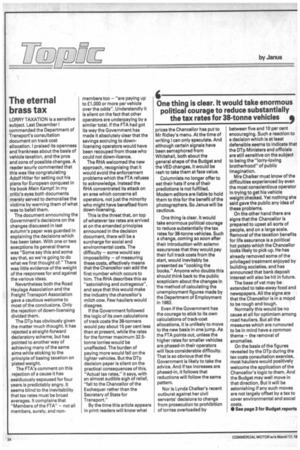One thing is clear. It would take enormous political courage to reduce substantially the tax rates for 38-tonne vehicles
Page 26

If you've noticed an error in this article please click here to report it so we can fix it.
prices the Chancellor has put to Mr Ridley's menu. At the time of writing I can only speculate. And although certain signals have been semaphored from Whitehall, both about the general shape of the Budget and the VED changes, it would be rash to take them at face value.
Columnists no longer offer to eat their hats if one of their predictions is not fulfilled. Modern editors are liable to hold them to this for the benefit of the photographers. So Janus will be cautious.
One thing is clear. It would take enormous political courage to reduce substantially the tax rates for 38-tonne vehicles. Such a change, coming so soon after their introduction with solemn assurances that they would pay their full track costs from the start, would inevitably be presented as "cooking the books." Anyone who doubts this should think back to the public scepticism about the changes in the method of calculating the unemployment figures made by the Department of Employment in 1982.
Even if the Government has the courage to stick to its own calculations of track-cost allocations, it is unlikely to move to the new basis in one jump. As the FTA points out, unless the higher rates for smaller vehicles are phased-in their operators will face considerable difficulty. That is so obvious that the Government is likely to take the advice. And if tax increases are phased-in, it follows that reductions will follow the same pattern.
Nor is Lynda Chalker's recent outburst against her civil servants' decisions to change from prosecution to prohibition of lorries overloaded by
between five and 10 per cent encouraging. Such a reaction to a decision which is at least defensible seems to indicate that the DTp Ministers and officials are still sensitive on the subject to being the "lorry-loving brotherhood" of public imagination.
Mrs Chalker must know of the difficulties experienced by even the most conscientious operator in trying to get his vehicle weight checked. Yet nothing she said gave the public any idea of these problems.
On the other hand there are signs that the Chancellor is prepared to upset all sorts of people, and on a large scale. Removal of the taxation benefits for life assurance is a political hot potato which the Chancellor looks likely to pick up. He has already removed some of the privileged treatment enjoyed by building societies, and has announced that bank deposit interest will also be hit in future.
The base of vat may be extended to take-away food and newspapers. All the signs are that the Chancellor is in a mood to be rough and tough.
Normally this would be no cause at all for optimism among road hauliers. But all the measures which are rumoured to be in mind have a common theme — the removal of anomalies.
On the basis of the figures revealed by the DTp during the tax costs consultation exercise, most hauliers would positively welcome the application of the Chancellor's logic to them. And the Budget may well move in that direction. But it will be astonishing if any such moves are not largely offset by a tax to cover environmental and social
COStS.
• See page 3 for Budget reports
















































































































